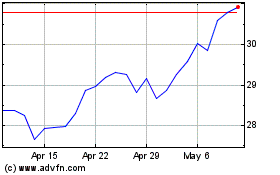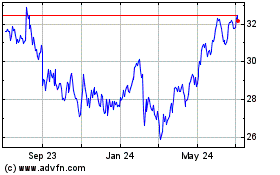Antitrust landscape changes with suit against AT&T-Time
Warner merger. Will Comcast-Fox talks be affected?
By Keach Hagey and Joe Flint
This article is being republished as part of our daily
reproduction of WSJ.com articles that also appeared in the U.S.
print edition of The Wall Street Journal (November 25, 2017).
In the past year, every single one of the biggest media
companies in the U.S. has either agreed to a transformational
merger or considered one. Now the industry is trying to figure out
what the Justice Department's lawsuit to block AT&T Inc.'s
acquisition of Time Warner Inc. means for other deals.
Analysts have been especially interested in weighing the
potential impact on Comcast Corp.'s desire to acquire a significant
chunk of 21st Century Fox's assets.
Comcast is continuing its talks with Fox and doesn't think the
proposed deal would face the same regulatory hurdles because the
vast majority of the revenue from the Fox assets in question comes
from overseas, said a person familiar with Comcast's thinking.
Plus, Comcast already owns content from its prior acquisition of
NBCUniversal. Therefore, the media giant sees the acquisition of
some Fox content assets as more of a "horizontal" deal of like
businesses rather than a "vertical" merger akin to AT&T-Time
Warner.
But others question that thinking. A Comcast/Fox deal would
combine a content provider and a distributor -- similar to the
AT&T deal that the Justice Department is arguing is
illegal.
"How could Comcast buy more content if AT&T can't buy Time
Warner?" asked Rich Greenfield, an analyst at BTIG Research.
The Wall Street Journal reported last week that Comcast was one
of several suitors in talks to buy Fox's studio, some U.S. cable
networks such as FX and National Geographic, and its international
businesses.
Of course, it's possible that AT&T will win its case and be
able to buy Time Warner. AT&T CEO Randall Stephenson said
Monday that the company was ready to square off against the
government in court. The healthy performance of most media stocks
on Tuesday -- the first trading day after the government filed its
suit -- suggests investors may be betting the government doesn't
have a strong case.
But while the litigation drags on, M&A in the sector is
likely to take a "four- or five-month pause," Mr. Greenfield
said.
The pause comes as the industry is under intense pressure from
the acceleration of cord-cutting, the growing power of tech
companies such as Netflix, Amazon and Facebook, and a wave of
consolidation among pay-TV distributors that has left the giants of
media searching for a transformational next move.
This fall, those pressures led Walt Disney Co. to reach out to
Fox to discuss buying a substantial piece of its entertainment
assets. Although the talks have cooled, they helped put Fox in
play. Fox has since been approached by a host of suitors including
Comcast, Sony and Verizon, the Journal has reported.
Analysts and investors are now trying to analyze which
combination may be acceptable to antitrust officials. Telsey
Advisory Group analyst Thomas Eagan wrote in a research note that
the DOJ's suit and clear concerns about vertical mergers makes it
difficult for Comcast or Verizon to purchase Fox assets, leaving
Disney -- and possibly Sony -- as "the only real buyer."
For Comcast, there are also other factors to consider. For one,
some antitrust experts have argued that the government didn't do
enough to limit Comcast's power when it took control of
NBCUniversal in 2011. Comcast would also be acquiring Fox's movie
and television studios, making it an even larger producer of
content and reducing the number of major studio, which could be a
concern for regulators.
Comcast is also interested in buying Fox's regional sports
networks, according to the person familiar with Comcast's thinking,
assets that weren't under discussion with Disney.
21st Century Fox and Wall Street Journal parent company News
Corp share common ownership.
The interest in Fox marks just the latest in a series of merger
talks across the media industry over the past year: Discovery
Communications struck a deal this summer to acquire Scripps
Networks International. Last year, Viacom Inc. and CBS Corp.
explored a merger that would have reunited the companies a decade
after their separation.
"Six months ago, the market believed that the industry was
poised to see further, significant and maybe unprecedented
consolidation over the next several years, driven as much by
defensive tactics -- building a moat around the business -- as
offensive," said William Drewry, founding partner at Pursuit
Advisory, a boutique advisory firm specializing in media. "Now that
is under serious question."
Indeed, it is exactly this kind of moat-building that the
Justice Department said it is trying to prevent. In the complaint
filed on Monday, one of the reasons it cited for blocking the deal
was that a merged AT&T-Time Warner would have the power and
incentive to slow the growth of new online video distributors that
are disrupting its business. (Mr. Stephenson has said that the
point of buying Time Warner was to take its content and give it
broader distribution, not more limited distribution.)
Some analysts believe a horizontal merger between two content
providers -- the kind of deal that traditionally receives more
scrutiny from antitrust officials because it eliminates a direct
competitor -- might still be able to pass muster in today's
regulatory environment, precisely because it doesn't pose the same
risks to new online entrants.
Guggenheim Securities analyst Michael Morris argues that Time
Warner could still conceivably merge with Disney, Fox or CBS --
should the AT&T deal fall apart.
Write to Keach Hagey at keach.hagey@wsj.com and Joe Flint at
joe.flint@wsj.com
(END) Dow Jones Newswires
November 25, 2017 02:47 ET (07:47 GMT)
Copyright (c) 2017 Dow Jones & Company, Inc.
Fox (NASDAQ:FOX)
Historical Stock Chart
From Mar 2024 to Apr 2024

Fox (NASDAQ:FOX)
Historical Stock Chart
From Apr 2023 to Apr 2024
